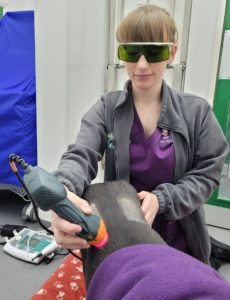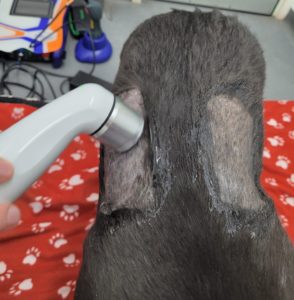
Once a vet has made a diagnosis of arthritis in your pet there is a huge range of treatment options available which can help. What works best for one pet may be different for another. This article summarises what is available – for more detail, ask for a copy of our arthritis information pack.
NUTRACEUTICALS
Nutraceuticals are better known as supplements. They are items we can add to our pet’s nutrition either via their diet (added into the food) or as tablets/capsules. Most joint supplements will contain one or more of the following:
- Glucosamine
- Chondroitin sulphates
- Collagen
- Omega 3 fatty acids
- Hyaluronate (hyaluronic acid, hyaluronan)
- Boswellia extract
They act either as chondroprotectives (looking after the cartilage), or anti-inflammatories. There are a wide range of nutraceuticals and diets available specifically designed for joint care in dogs and cats. It is recommended to use these over human supplements. This is because human supplements are often at the wrong strength and aren’t absorbed as well by the dogs and cats. Ask a member of our team for more information on the range of joint supplements and diets we have available.
Nurse Laura Sproul can provide expert advice on weight control, diets and nutraceuticals in her nutrition clinics.
REGENERATIVE MEDICINE
Regenerative medicine is using the body’s own cells to heal and regenerate damaged tissues. Therapies included are Platelet Rich Plasma (PRP) and Bone Marrow Aspirate Concentrate (BMAC) Stem Cells. These therapies can be used to help with the management of arthritis in dogs. These therapies can be used alongside other treatments, such as laser therapy, and can reduce the dog’s reliance on pain medication. You can find out more here.
COMPLEMENTARY THERAPIES
Complementary therapies are non-medical treatments that can be used to help relieve symptoms and issues associated with a variety of ailments. We have several options available to help with arthritis:
- Laser therapy (reduces inflammation and pain)
- Pulsed Electromagnetic Field Therapy (PEMF) mat
- Therapeutic ultrasound
- Physiotherapy exercises


You can find out more here.
If any of these therapies are of interest to you, we can assess your pet and discuss which would be appropriate. Head Nurse Caz has a further qualification in rehabilitation and physiotherapy and can help formulate a plan for your pet including physiotherapy exercises for at home.
MEDICATIONS
Some pets improve markedly with weight and exercise management, and complementary therapies alone, but many will benefit from medication.
Non-steroidal anti-inflammatory drugs (NSAIDs)
These medications are pain killers and reduce inflammation directly in the joint. They have been used for many years and can dramatically improve quality of life for arthritic pets. There are liquid and tablet options available. They should always be used under veterinary guidance, and it is critical not to use medications designed for humans as these can be fatal to dogs and cats.
Anti nerve growth factor monoclonal antibody
Monoclonal antibodies are being used widely in humans, but these are relatively new therapies for pets. The monoclonal antibody is a protein which targets nerve growth factor, and therefore reduces pain signals to the brain. It is administered in the veterinary practice as a monthly injection.
Additional painkillers may be prescribed by the veterinary surgeon.
The key take-home from this article is there is a lot we can do to help arthritic pets lead happier and more comfortable lives!
If you haven’t already, check out our previous articles on spotting the signs of arthritis, and things you can do to help your pet at home.
